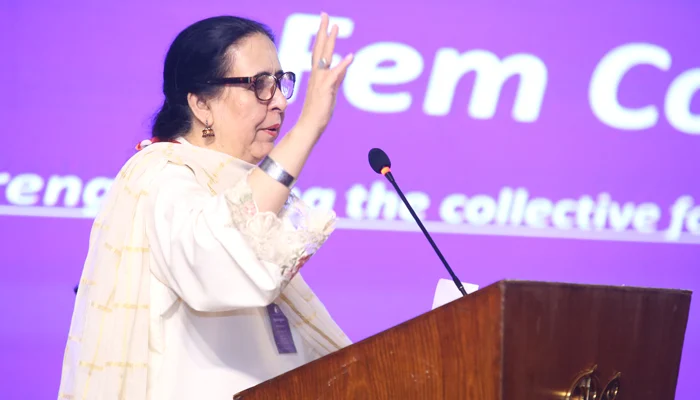The two-day annual conference of FemConsortia, an alliance of twelve women’s rights organisations and five alliances from across Pakistan began in Karachi on Tuesday.
The consortium evolved as a result of a five-year programme of Oxfam, titled Women’s Voice and Leadership-Pakistan embracing feminist to sustain transformation achieved at individual, organisational, and community levels.
Discussion papers were assigned to researchers on the topics of:
Speaking at the Plenary, Executive director of NowCommunities and Convenor of the Conference, Farhat Parveen which holds the current secretariat of FemConsortia explained the journey from its formation to the present. She appreciated the forerunners in the struggle for women’s right and acknowledged the role of male allies and called for the growing of the tribe.
In her opening remarks, Ombudsperson of Khyber Pakhtunkhwa Rakhshanda Naz spoke of the long struggle of brave women in changing oppressive societal norms, which were overturned by the brave women of Pakistan, despite vilification and pushback.
FemConsortias two-day annual conference kicks off in Karachi
The detailed presentation of the paper ‘Women in Politics’ busted many myths and listed some very clear wins and the valuable role of women in progressive legislation.
The panellists discussing the paper written by Zeeshan Noel included Salman Abid of the Mumkin Alliance, Iftar Mufti, of South Asia Partnership, Pakistan, and Mangla Sharma, former MPA Sindh.
They appreciated the findings of the research paper which clearly showed the strides made by women in the political sphere, where they even scored many firsts; like the first speaker, foreign minister, prime minister, women’s parliamentary caucus and their role in many women friendly laws.
The discussion paper on adolescent girls was authored by Rabeea Hadi, and she highlighted the grave threats they young girls and many violations of their rights that lead to physical, mental, emotional and social threats for them.
FemConsortias two-day annual conference kicks off in Karachi
The panellists, Sadiqa Salahuddin of Indus Resource Center, Nisma Iqbal of Zindagi Trust, Manize Bano of SAHIL, and Robeela Bangash highlighted the different nature of threats they now faced which have not disappeared but have evolved into newer ones.
The final Plenary, moderated by Uzma Zarrin of OXFAM Pakistan highlighted the importance of indepth research and conversations on the selected topics. The panellists Sajjad Abro of SHADE Jaffarabad, Harris Khalique, Secy Gen. of Human Rights Commission of Pakistan, Mahnaz Rehman, resident Director of Aurat Foundation, Sarah Zaman, researcher on Violence against Women, and Psychologist Asha Bedar acknowledged that most of the problems related with the rights of girls and women stem from the role assigned to them as women. The issues related to their worth, their choices now once visible change is that despite the patriarchal structures many young girls have awareness as well as the vocabulary to articulate their issues. The engagement modality has changed because of the political engagement.
The closing remarks to the discussion and questions session were made by Professor Farkhunda Aurangzeb, member of the National Commission of Human Rights. She was also Pakistan’s signatory on the Beijing Platform for Action on Women.
The evening concluded with a mushaira featuring leading poets of the country with a clear feminist stance. It was moderated by Sadia Baloch of NOWCommunities and Presided over by Tanveer Anjum

